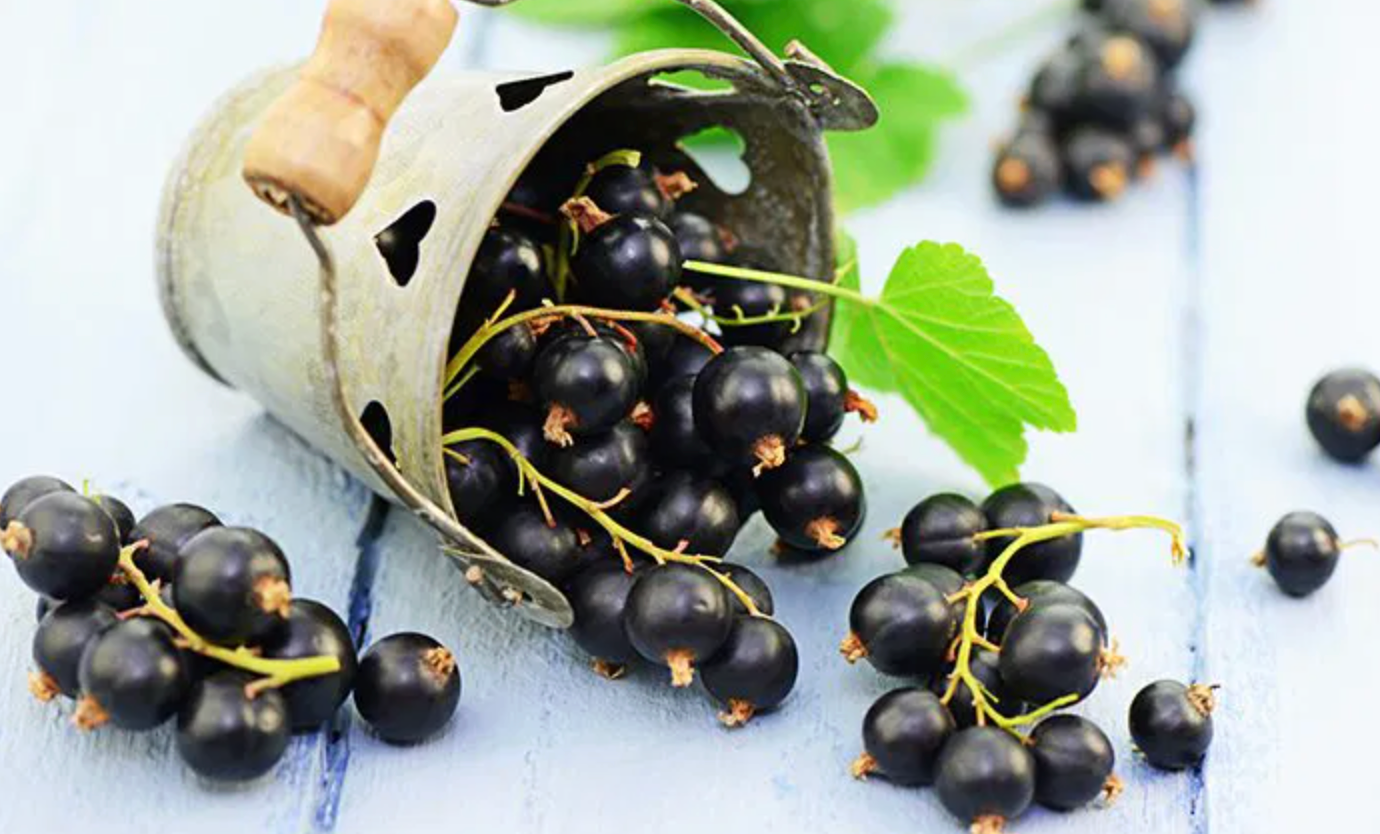
Blackcurrant Seed Oil: The Anti-Inflammatory Powerhouse
How this purple berry's seeds became nature's most potent source of gamma-linolenic acid.
Deep purple and jewel-like, blackcurrants have long been treasured across Northern Europe for their intense flavour and remarkable health properties. But whilst the berries themselves capture attention, it's the tiny seeds within that hold the true therapeutic treasure: one of nature's richest sources of gamma-linolenic acid (GLA), a rare omega-6 fatty acid that acts as the body's natural anti-inflammatory agent.
Unlike common omega-6 oils that can promote inflammation, blackcurrant seed oil contains a unique fatty acid profile that actively fights inflammation whilst supporting skin health, immune function, and cellular repair.
The GLA Advantage
Blackcurrant seed oil stands apart from other botanical oils due to its exceptional GLA content. Oil produced from blackcurrant seeds contains 13% omega-3 alpha-linolenic acid (ALA) and 17% omega-6 gamma-linolenic acid (GLA)¹. To put this in perspective, blackcurrant seed oil contains approximately 17% GLA compared to evening primrose oil's 8-10%, making it nearly twice as potent².
GLA is an essential fatty acid that's important for maintaining cellular structure and function. Your body converts it into hormone-like substances called prostaglandins, which regulate your immune system and fight joint inflammation. GLA might also suppress inflammatory responses by directly acting on some inflammatory cells¹.
The Anti-Inflammatory Mechanism
The power of blackcurrant seed oil lies in its sophisticated anti-inflammatory mechanisms. Numerous studies primarily carried out in the 1980s and 1990s demonstrated that GLA-enriched botanical oils (evening primrose, borage, blackcurrant seed, and fungal-derived) had the capacity to relieve the signs and symptoms of several chronic inflammatory diseases, including rheumatoid arthritis (RA) and atopic dermatitis³.
The key lies in how GLA is metabolized. In the body, GLA is converted to dihommo-gamma-linolenic acid (DGLA), which then produces anti-inflammatory compounds rather than the pro-inflammatory substances typically associated with omega-6 fatty acids. This unique metabolic pathway makes blackcurrant seed oil a powerful ally against inflammation³.
Clinical Evidence for Inflammatory Conditions
Rheumatoid Arthritis
Blackcurrant seed oil has shown particular promise in treating rheumatoid arthritis. In a randomized, double-blind, placebo-controlled, 24-week trial, patients with RA and active synovitis were treated with blackcurrant seed oil. Treatment resulted in reduction in signs and symptoms of disease activity in patients with RA (P < 0.05). In contrast, patients given a placebo showed no change in disease⁴.
In another study, participants taking blackcurrant seed oil had significant reduction in morning stiffness at the end of treatment, with some showing a significant but moderate reduction in joint tenderness¹.
Immune System Support
Research has demonstrated that blackcurrant seed oil can modulate immune function. A randomized, double-blind, placebo-controlled study examined the effect of 2 months of blackcurrant seed oil supplementation on the immune response of 40 healthy subjects aged 65 years and older. The study found that blackcurrant seed oil has a moderate immune-enhancing effect attributable to its ability to reduce prostaglandin E₂ production⁵.
Skin Health Applications
The anti-inflammatory properties of blackcurrant seed oil extend to skin health. In studies of human dry skin treated with blackcurrant seed oil, after multiple applications in an emulsion preparation, complete impregnation of the stratum corneum was achieved, demonstrating the oil's excellent penetration properties⁶.
Research has also shown promise for preventing atopic dermatitis, with clinical trials investigating blackcurrant seed oil supplementation in newborns showing positive results for skin health⁵.
The Metabolic Advantage
What makes blackcurrant seed oil particularly effective is its ability to bypass common metabolic limitations. Many people have inefficient conversion of dietary linoleic acid to GLA due to reduced enzyme activity from factors like aging, stress, and poor diet. Blackcurrant seed oil provides GLA directly, circumventing this metabolic bottleneck².
Each softgel of quality blackcurrant seed oil typically contains 535 mg of pure oil, providing approximately 80mg of GLA along with 55mg of alpha-linolenic acid, 235mg of linoleic acid, and other beneficial fatty acids⁷.
Safety and Tolerability
Studies on GLA-rich oils suggest that they're relatively well tolerated with no serious side effects. No studies appear to have been done to assess the safety of blackcurrant seed oil specifically in people with musculoskeletal conditions, but the overall safety profile appears favourable¹.
The main challenges reported in clinical trials have been related to dosage requirements - some studies required participants to take up to 15 large capsules daily, leading to compliance issues rather than adverse reactions⁴.
Modern Applications
Today, blackcurrant seed oil is increasingly recognized for its potential in:
-
Inflammatory Skin Conditions: Eczema, dermatitis, and general skin inflammation
-
Joint Health: Particularly for morning stiffness and inflammatory arthritis
-
Immune Support: Especially in aging populations
-
Cardiovascular Health: Through its anti-inflammatory mechanisms
-
Skin Barrier Function: Improving dry skin and barrier repair
The Future of GLA Research
This emerging understanding suggests that blackcurrant seed oil's high GLA concentration may be particularly beneficial for individuals who have difficulty producing adequate GLA endogenously.
A Natural Solution for Modern Inflammation
In our modern world, chronic inflammation underlies many health challenges. Blackcurrant seed oil offers a natural, well-researched approach to supporting the body's anti-inflammatory pathways. With its superior GLA content and proven clinical effects, this remarkable oil demonstrates how nature often provides exactly what we need - concentrated in the tiny seeds of a humble purple berry.
Blackcurrant seed oil represents the convergence of traditional wisdom and modern science, offering a potent natural solution for inflammation that's backed by decades of research and clinical validation.
References
-
Versus Arthritis. (2024). Blackcurrant seed oil: Uses, side-effects. https://versusarthritis.org/about-arthritis/complementary-and-alternative-treatments/types-of-complementary-treatments/blackcurrant-seed-oil/
-
Cytoplan. (2024). Blackcurrant Seed Oil | Omega-6. https://www.cytoplan.co.uk/blackcurrant-seed-oil
-
Cameron M, et al. (2016). Gamma-linolenic acid, Dihommo-gamma linolenic, Eicosanoids and Inflammatory Processes. European Journal of Pharmacology, 785, 77-86. https://pmc.ncbi.nlm.nih.gov/articles/PMC4975646/
-
Leventhal LJ, et al. (1994). Treatment of rheumatoid arthritis with blackcurrant seed oil. British Journal of Rheumatology, 33(9), 847-852. https://pubmed.ncbi.nlm.nih.gov/8081671/
-
Wu D, et al. (1999). Effect of dietary supplementation with black currant seed oil on the immune response of healthy elderly subjects. American Journal of Clinical Nutrition, 70(4), 536-543. https://pubmed.ncbi.nlm.nih.gov/10500023/
-
Darmstadt GL, et al. (2009). Evolution of lipid composition in skin treated with blackcurrant seed oil. International Journal of Cosmetic Science, 24(1), 69-74. https://pubmed.ncbi.nlm.nih.gov/19456920/
-
Biotics Research. (2024). Blackcurrant Seed Oil. https://shop.bioticsresearch.com/products/blackcurrant-seed-oil


